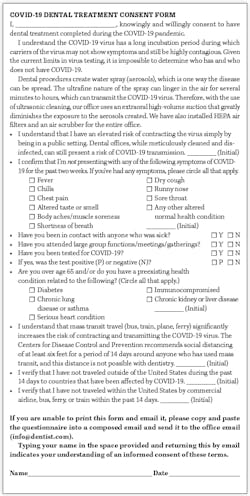Do you need a COVID-19 informed consent?
Download the COVID-19 informed consent form here.
In this new normal, there is concern from patients and dental team members regarding the safety of dental care. Many patients are hesitant, anxious, and even stressed about the thought of going to the dentist. Some staff members have decided to find another line of work, and some dentists have decided not to continue to practice.
Dentistry has a very proactive history of being one of the best infection control proponents, from HIV/AIDS in the ’80s to today’s pandemic. Patients have become very trusting of their dentists to provide a clean and safe environment for their dental care. By having a COVID-19 informed consent form, your patients will be clearly informed about the risks that exist and your efforts to fight them. The form is not designed to give patients a false sense of security but to educate them about the innate risks present in today’s dental environment.
Working in a high-aerosol environment, there are many things that can be done to reduce the escape of fine aerosols into the office air. However, the office remains an environment where fine aerosols exist, even with the best efforts to eliminate them. Patients should be informed about your efforts to reduce fine aerosol exposure, and they should be told that there is still a risk of exposure to fine aerosols.
Point out what you’re doing to actively reduce exposure, such as extraoral high-volume suction, pretreatment peroxide rinse, office air filter upgrades, after-hours fumigation and fogging, air scrubbers, and more. All of these efforts help reduce patients’ fears about returning to active dental care. They also help reduce staff concerns about exposure while working.
What is informed consent?
It should be noted that an informed consent is not a waiver of negligence or a release of liability. It is merely a written document that confirms or memorializes the communication or understanding between patient and dentist. With the need for patients to be aware of the new dental environment prior to entering the office, a doctor-to-patient discussion is not possible. Hence, there should be a protocol to educate patients before they enter the office. I believe a COVID-19 informed consent form is needed.
It’s not just patients who should understand the dental environment, but the staff also need to know patients’ possible exposure to COVID-19. It is in the best interests of patients and the entire dental team to give patients the COVID-19 informed consent prior to their entering the office. It can be accessible on your website, by email, or faxed to your office, or a staff member can take it to patients who wait outside the office.
The COVID-19 informed consent should cover both the dentist’s and staff’s concerns as well as the patient’s understanding of the risks. This awareness allows each to move forward in a trusting doctor-patient relationship during the pandemic.
It is not below the standard of care not to offer the COVID-19 informed consent. The form is a risk management tool to prevent any misunderstanding by patients, the dentist, or staff. Some have stated that it would be extremely hard to attach liability to a dentist in cases where the patient has contracted COVID-19 directly from the dental office. Others say it may be possible to connect the patient’s symptoms to the dental office by matching the viral strain. Regardless of your scientific or political viewpoint, you need to do what is best for your patients, staff, and yourself.
In the event that a successful long-term vaccine becomes available, an additional question should be placed on the practice’s medical history form about whether a patient has been vaccinated. If the patient has not been vaccinated, then a COVID-19 informed consent form should be used.
Contact your dental malpractice insurance company to see if they have a form available. Many variations of a COVID-19 informed consent form are possible due to the many different needs of practices. If you cannot obtain a form, some information and example questions that should be on the form are listed here.
What should be included on the form
There should be a statement that allows patients to acknowledge that they are knowingly and willingly consenting to have dental treatment completed during the COVID-19 pandemic.
There should be a statement that a patient acknowledges their understanding that the COVID-19 virus has a long incubation period, during which carriers of the virus may not show symptoms yet still be highly contagious. Given the current limits in virus testing, it is impossible to determine who has COVID-19 and who does not by way of an immediately accessible test that is 100% accurate.
Make sure you inform patients of all that can occur in the dental setting and what your practice is doing about it. An example is that dental procedures create water spray (aerosols), which is one way the disease can spread. The ultrafine nature of the spray can linger in the air, which can transmit the virus. With the use of ultrasonic cleaning, dentists can use an extraoral high-volume suction that greatly diminishes exposure to any aerosols created. Our office has installed HEPA-quality air filters and a whole-building air scrubber.
You need to know the patient’s exposure history for at least two weeks. Ask if they have traveled within the US using mass transit or traveled outside the US within the past 14 days. This is not a disqualifier not to see the patient. But it does allow you to assess the exposure to you, your staff, and other patients, and helps in the decision to either move forward with treatment or wait two weeks.
Ask if the patient has any flu-like symptoms. It is now known that some people do not experience any symptoms but at least you can take every precaution by asking.
Find out if the patient has had contact with anyone who has been sick, if they attended any group functions, meetings, or gatherings, and if they have been tested for COVID-19. If so, when and what were the results?
Include information regarding the patient’s medical history on your intake form that explains any preexisting conditions and age that would heighten the patient’s exposure risk.
With a COVID-19 informed consent form, all parties are aware of the possible exposure from the dental office environment and from one another.
Figure 1 below is a copy of the suggested consent form for use in your practice.
Download the form here.
About the Author
Joseph P. Graskemper, DDS, JD, DABLM, DABMM, FACD, FACLM, FAES, FAGD, FASO, FICOI
JOSEPH P. GRASKEMPER, DDS, JD, DABLM, DABMM, FACD, FACLM, FAES, FAGD, FASO, FICOI, is an associate clinical professor at Stony Brook School of Dental Medicine, where he teaches professionalism, ethics, and risk management. Dr. Graskemper has authored many peer-reviewed articles, lectured, published nationally and internationally, and written two books, Professional Responsibility in Dentistry: A Guide to Law and Ethics and Leadership and Communication in Dentistry. He may be reached at [email protected] for comments or consultations.
Updated December 30, 2020


